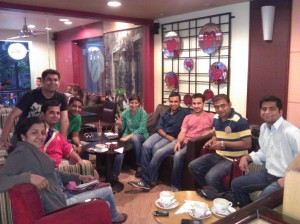Last Sunday (24 Jul) we had our first meeting of everyone who volunteered to join our team in Bangalore. Till now, we have been working on developing the website and asking people to join. We already had discussions with a few NGOs / fights and this meeting was the starting point for our on-the-ground operations in Bangalore. I was absolutely delighted to see 10 people turning up and contributing with their ideas, opinions and suggestions for Pick a Fight.
What was amazing to see was the enthusiasm among everyone as each of us shared about the volunteering they have already done. Ayush recalled several activities he has been a part of while being associated with his company. Pavithra told us about a few NGOs she had visited. She also told us about her ‘India Innoventor‘ project which she is very keen to start. Rinkesh mentioned about a place where he went with Ayush once for volunteering. Others shared their experiences too. It was wonderful to hear about all these experiences.
We shared about the fights/causes we already have on-board with Pick A Fight. Anupama spoke about an orphanage cum school which she visited and interacted with recently. She spoke about the requirements of teachers (to teach Maths, English) and of funds for the orphanage. We also explained the purpose behind Gift Your Organ, whose founder we met a few weeks ago, who have taken on the cause of organ donation to make sure nobody dies for a lack of an organ donor. I also mentioned about Beyond Carlton, a fire safety and awareness movement started by the father of a 23 old victim in the Carlton Towers fire tragedy which happened in Feb 2010.
One of the common areas where these NGOs can utilize our help is spreading awareness. Whether the cause is about organ donation or fire safety or recycling, the awareness factor among the common man is quite low. For example, in UK, 25% of the population have pledged their organs and they are very unhappy about the figure. There are no official figures in India, but the number won’t be even 0.25%. Another way to help these NGOs would be by connecting them to volunteers who are willing to spend a few hours every week with them, teaching kids or spending some time with senior citizens.
Fundraising is another common area where most NGOs need help. But it is also something which will be most challenging. There have been many instances where NGOs have been used as a front to siphon off money, and hence credibility and accountability becomes a big issue. The challenge will be to connect different causes and bring them on a common and reliable platform which they can use to raise funds for their activities. We will also have to make sure that the money is used for the advertised purposes and not for any other activities.
We surely have a long way to go, and there will be many challenges along the way. While it was great to see the enthusiasm and energy of all the participants, we would need to be very patient at times when things are moving slowly or not as planned. We would have to keep one eye on the long term vision and not get distracted by small obstacles along the way. It will also be critical to keep our focus on the activity at hand and try to give the best possible service to the NGO / cause we are working with.
At the end of the meeting, we all agreed that we would need to grow our network to include like minded individuals across sectors, industries and companies. As more and more NGOs begin to reach out to us, the important thing will be to be ready for them when they approach us. Very soon we will start ground campaigns on organ donation, fire safety, waste management, among others and it will be critical to have a big network to reach out to as and when we need their support.
So let’s get together, let’s spread the word about our activities and plans, and let’s make a difference. If you have taken part in any volunteering activity, write an article or share a story with us. If you have not yet joined us on facebook and linkedin, do so now. In this way you can stay updated about our activities and help with any if you are in a position to do so. Also invite your friends and colleagues to be a part of these communities and engage in conversations.
The road might not be easy. The destination might not be clearly visible. But let us all take the first step, and then the second, third, and so on… Cheers!!


